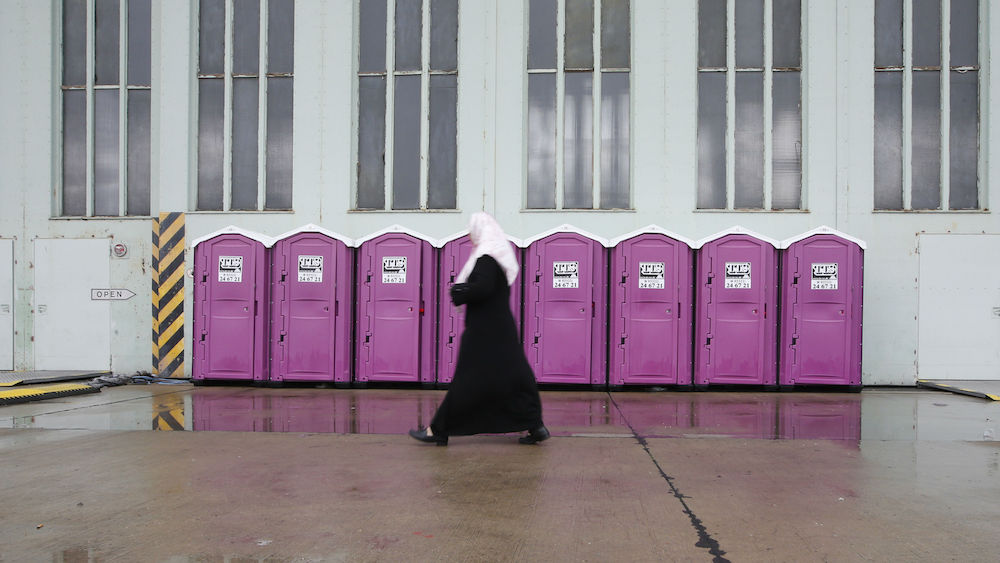Is the German chancellor changing her tune on immigration and Islam? At her party’s annual congress, she received huge applause for suggesting that full face veils should be banned. Yet careful reading of the full quote proves that Angela Merkel has no intention of disowning her policy on refugees in the coming election campaign.
In January 2015, Angela Merkel shocked many of her more conservative voters by declaring that “Islam is part of Germany,” echoing a 2010 declaration from former German president Christian Wulff. It wasn’t the first time she said it, but in the wake of the Islamist terrorist attacks on the satirical magazine Charlie Hebdo and a Jewish supermarket in Paris, the statement was particularly potent. Later that year, she took the fateful decision to open the country’s borders to hundreds of thousands of refugees from Syria and elsewhere trapped in Hungary. Selfies of young refugees posing with the chancellor were shared around the world.
Now she appears to have changed her tone. At the annual congress of her Christian Democratic Union (CDU) in early December, Merkel called for a ban on full-face Muslim veils. “Here we say ‘show your face’,” Merkel said, drawing enormous applause from the roughly 1000 delegates at the party congress. “So full veiling is not appropriate here. It should be prohibited wherever legally possible.”
With Merkel’s approval, the CDU also called for quicker deportation for immigrants whose asylum request had been denied. It welcomed the EU’s agreements with Turkey and countries in North Africa to reduce the number of refugees seeking asylum in Europe. Proposals for introducing transit zones for newly arrived refugees also won support.
Obviously, this has much to do with next year’s federal election. In September 2017, Angela Merkel will try to win a fourth term in office. It will be a very difficult campaign, with the populist Alternative für Deutschland (AfD) a dangerous new competitor on the right.
For years, Merkel successfully pushed her party toward liberal positions, including the approval of gay rights (though stopping short of supporting gay marriage) and the end of conscription. Now she is coming under enormous pressure from her own grass roots to show more of a conservative, law-and-order profile.
Populists on the March
This territory is already painfully familiar to other world leaders who have seen votes shift to anti-immigration and anti-Muslim movements. Britain’s Brexit vote is one example, but so is Donald Trump’s success in the United States. Next year’s elections in France and the Netherlands are also predicted to bring solid gains for the populists.
Much of this political shift is fueled by fear of globalization. According to a recent study by the Bertelsmann Foundation, it is the single most important motivation for supporters of right-wing populist movements. In this context, fear of globalization also translates into the belief that immigration has spiraled out of control. The chaos surrounding the arrival of nearly a million refugees to Germany in 2015 helps populist leaders to make this point.
As governments in Europe despair of being able to explain the complex issues surrounding globalization to their voters, banning burqas has become a favorite gesture. France’s Francois Fillon, newly chosen to be the conservative party’s candidate for the presidential elections next spring, endorses banning the full veil. The Dutch parliament just voted to ban women wearing a burqa from using public transport.
So is Merkel jumping on the populist bandwagon? She has certainly come to appreciate the power of public sentiment about immigration and Islam. She also understands that it has become a matter of political survival for herself and her party to keep the numbers of new refugees in the country relatively low.
Yet the exact wording she chose for her party speech is significant. Banning full veils “wherever legally possible” is what Merkel said. This means showing your face when you have to appear in court or when the police check your identity – not being hassled for wearing a veil on the beach or in the subway. Merkel also publicly criticized a proposal endorsed by just over half of the party delegates to ban double citizenship for immigrants.
Merkel’s Balancing Act
What we are seeing is a balancing act: on the one side, the chancellor needs to show that she takes concerns over immigration seriously; on the other, she simply cannot disown her own past policies. She will not give up her own principles for a populist campaign; after nearly twelve years at the helm, that would be too high a price to pay for a fourth term in office.
With any luck, Merkel’s stance may actually appeal to German voters who, after all, are also ambivalent on the refugee issue. In a recent poll conducted by the Friedrich Ebert Foundation, four in ten voters said that Germany was being subverted by Islam. But 56 percent said it was a good thing that their country had taken in the refugees. This is backed by the many private initiatives which are still very active in helping refugees settle into their new life in Germany.
With ten months to go until next year’s elections, Merkel’s speech at the party congress certainly was significant. Nobody gets this far in politics without being attuned to public sentiment, and Merkel is not above paying lip service to populist sentiments. But don’t expect a shift in substance.







